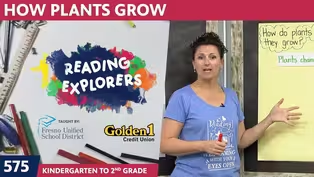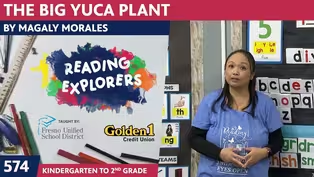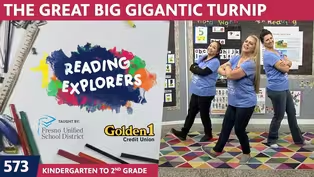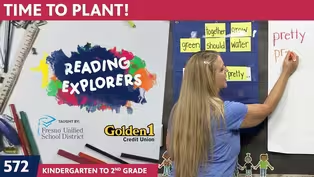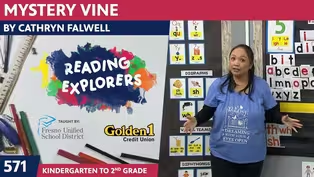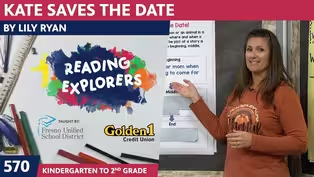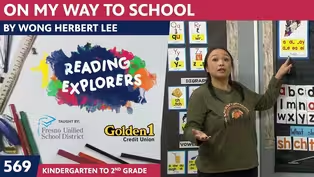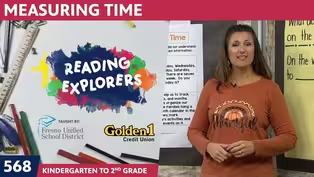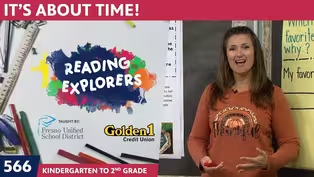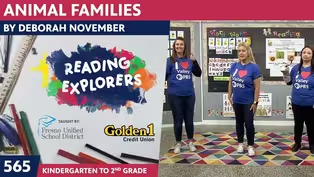
3-388: The Suffixes '-ly' '-less' & '-ful'
Season 3 Episode 500 | 14m 8sVideo has Closed Captions
Join Mrs. Nix at Camp Discovery!
Third Grade teacher, Mrs. Nix, welcomes students back to Camp Discovery, a fun learning space packed with reading adventures & fun games!
Problems playing video? | Closed Captioning Feedback
Problems playing video? | Closed Captioning Feedback
Reading Explorers is a local public television program presented by Valley PBS

3-388: The Suffixes '-ly' '-less' & '-ful'
Season 3 Episode 500 | 14m 8sVideo has Closed Captions
Third Grade teacher, Mrs. Nix, welcomes students back to Camp Discovery, a fun learning space packed with reading adventures & fun games!
Problems playing video? | Closed Captioning Feedback
How to Watch Reading Explorers
Reading Explorers is available to stream on pbs.org and the free PBS App, available on iPhone, Apple TV, Android TV, Android smartphones, Amazon Fire TV, Amazon Fire Tablet, Roku, Samsung Smart TV, and Vizio.
Providing Support for PBS.org
Learn Moreabout PBS online sponsorshipMore from This Collection
Valley PBS and Fresno Unified School District have partnered with Golden 1 Credit Union to create Reading Explorers Lessons for grades Pre-Kindergarten through Third grade. The daily lessons will be taught by Fresno Unified School District teachers and are created to help students practice their reading skills and reinforce lessons during distance learning.
Video has Closed Captions
Learn about the life cycle of a plant on Reading Explorers. (26m 39s)
K-2-574: The Big Yuca Plant by Magaly Morales
Video has Closed Captions
Join the Reading Explorers as we adventure into a new book The Big Yuca Plant. (26m 30s)
K-2-573: The Great Big Gigantic Turnip
Video has Closed Captions
What will happen at The Great Big Gigantic Turnip? (26m 30s)
K-2-571: Mystery Vine by Cathryn Falwell
Video has Closed Captions
The Bell has rung and the Valley PBS Classroom is open once more. (26m 32s)
K-2-570: Kate Saves The Date by Lily Ryan
Video has Closed Captions
Mrs. Nix, Mrs. Hammack and Mrs. Vang are glad to have you join her for a new day. (26m 32s)
K-2-569: On My Way To School by Wong Herbert Lee
Video has Closed Captions
Mrs. Vang is ready for a new day of phonemic awareness and reading comprehension. (26m 40s)
Video has Closed Captions
We review phonics, frequency words and more on Reading Explorers. (26m 45s)
K-2-567: Nate The Snake Is Late
Video has Closed Captions
What happens when Nate the Snake is late to school? (26m 49s)
Video has Closed Captions
It's time for school! How do you know what time it is? (26m 31s)
K-2-565: Animal Families by Deborah November
Video has Closed Captions
Welcome to the Reading Explorers lessons in the Valley PBS Classroom. (26m 14s)
K-2-564: From Caterpillar To Butterfly
Video has Closed Captions
The transformation from Caterpillar to Butterfly is a special one. (26m 52s)
Providing Support for PBS.org
Learn Moreabout PBS online sponsorship♪ Good morning to a brand new day ♪ ♪ Time to learn and the games to play ♪ ♪ Learning things is so much fun ♪ ♪ Learning is good for everyone ♪ (playful music) - Good morning, third graders.
My name is Mrs. Nix and I am so excited to be here with you here at our PBS classroom to support you as you become amazing thinkers, readers, and writers.
You're gonna notice there are a few little decorations around here and it's because we're counting down our final few days before we get to go on a little bit of a summer vacation.
As we're talking about summer vacation, don't fret.
We have more programming coming up for you for your summer stuff.
But I do wanna encourage you to continue to do your reading and to do some really fun activities.
And one of the things I wanna encourage you to do, if you haven't already done, is to write to the studio.
You're gonna see the address popping up below, and you can send me an email.
You can write me a letter.
You could send me a card.
You can tell me thing you've been learning, things that you're excited to do this summer.
And I will put one of these activity books in the mail for you for free.
It's totally free.
It'll be something that you can do over your summer vacation.
All right, something else that I always wanna encourage, especially here at PBS, we are here to support you to become amazing readers.
So what should we be doing over summer?
That's right.
We should be practicing our reading.
And so finding an awesome book, check a book out from your local county library, your school library, go online, check out a book on Sora, and just enjoy reading.
And you can choose whatever book you would like to do.
That's the best part about summer vacation, right?
All right, we've got three things that we're gonna go through today.
We're gonna talk about suffixes, some irregular spelling, and then we're gonna finish off today talking about figurative language, specifically some idioms.
Are you ready to start?
Okay, so to warm up our brains, we're gonna look at those high frequency words.
We need to be able to not only read them but we need to spell them, write them correctly in our sentences.
We're gonna see a couple of homophones up here 'cause we're going to talk about those irregular spellings today.
So be on the lookout.
Think about it.
Can you think of some other spellings for some of these words?
All right, let's do it.
Here we go.
Must, much, myself, my, no, not, now, number, new, and never.
Did you see a couple of clues?
I kind of gave you some clues.
We'll find out as we get there.
Here's the first one.
We've got two words today.
We have no, N-O.
Can you think of another no?
Yes, K-N-O-W, but that's not the one we're practicing today.
And then we've got not, N-O-T.
Okay, help me use them in a couple of sentences today.
I have mm idea where my keys are.
Oh no, that doesn't sound good.
And he mm study for the test.
Hmm.
He did no?
Nah.
He did not study for the test.
Hopefully, he still did really well though, right?
All right, and I have no idea where my keys are.
Unfortunately, I can relate to that one quite often.
Just sad to say, Mrs. Nix sometimes puts her keys somewhere.
It just happens.
Okay, we're gonna switch gears.
We're gonna talk about our suffixes.
Remember, those are just a group of letters that are found at the end of a word.
We've been practicing them.
This is a great strategy to use, putting them on an index card or writing them into a journal so that you can go through and just read the prefixes or suffixes, these are suffixes, they're found at the end of a word, because you're training your brain to be able to recognize them quickly.
And they're gonna help you when you're reading words that are multisyllabic, especially in grades four, five, and six.
You're gonna really see a lot of them.
So if we can learn them in third grade, it just sets us up for success.
Okay, let's go through.
We're just gonna read them.
Here we go.
Ful, good, ous, less, ment, able, ness, ly, and back to ful, good.
Okay, so let's put those over there.
That's a great strategy.
You can practice it over summer.
Let's talk about our suffixes that we have today.
Remember, our base words actually can just, they work just fine on their own, they can stand alone, but our suffixes have to be attached to a word.
And they changed the meaning of our words.
And this, with ly, actually does something a little different.
It doesn't really have a meaning but it changes an adjective to an adverb.
So it really changes kind of what the word actually means, right?
So if we've got finally or it tells us how something is done, so final.
Okay, that would be kind of the end but I could say finally we're able to go, okay?
So we're finally able to do it.
It tells us how we're able to do it.
Okay, then we've got less, which means without.
So if I'm without harm, what is my word now?
Harmless, good.
And then we have this suffix ful, which means full of.
So I'm full of pity, that means that I am pitiful.
Okay, maybe people say that.
But here's something else.
This particular word ends with a Y.
And oftentimes, when we are adding a suffix to a word, we need to change that Y to an I.
And so I'm gonna do that right just like that so we can kind of see it.
Pitiful.
All right, it was kind of a pitiful way of adding my little I in there.
(laughs) Puns, puns.
Okay, third grade, here we go.
Talking about homophones this week, I want everyone to put their hands up to their faces like this and make a little phone because a homophone has to do with sounds.
It's what we're hearing.
Now, the meaning, the way that the word looks right here, words that sound the same but they look and mean something different.
So homo means same and phone mean sound.
So it has the same sound.
Here's what I'm talking about.
So see and sea, pair and pear, and I'm gonna just talk about this one today because I think it is hilarious world and whirled.
Saying that, they sound the same.
So here's Earth, this is our world, and whirled means like to spin around.
She whirled around the playground.
So homophones can be or have an irregular spelling to them, an irregular spelling pattern.
And so it's important for us, especially in third grade to really start paying attention to what those spelling patterns are.
Homophones are one thing that can kind of be tricky for us but here's another one, just irregularly spelled words.
Here's a couple of things that they can have.
Sometimes they might have silent letters, like in this word know.
Remember, at the beginning we talked about the word N-O, spells no, but look, this is its homophone.
It means to know something, to understand, right?
So it's got a silent K. Unusual vowel-sound spellings can also kind of trip us up when it comes to spelling because let's look at this word.
If we were to sound it out, it looks like bah-sy, right?
Bah-sy, but is bah-sy a word?
No, the actual pronunciation is busy, busy, but it doesn't look right, right?
So as third graders, we really have to have our detective hats on and we really have to think about how do we spell that word and how do we say that word because we wanna make sure that we're good readers and writers.
Okay, let's go through and let's practice a little bit down here.
So remember, the suffixes that we were practicing, they come at the end of a root or a base word, and we've got ful, which is full of, less means without and ly means in a certain way.
Okay, here we go.
Circle the word in each sentence that has the suffix ful, less or ly.
Write the root or base word on the first line and the suffix on the second line.
Pay attention for some spelling changes.
All right, help me out, third grade.
I finally got the package in the mail.
Do I see any words with those suffixes?
Ooh, I see one right here, finally.
All right, so what would be my base word?
Final, good.
And then what's my suffix?
L-Y, ly.
Good.
Let's do the next one.
Our class recycles and tries to be less wasteful.
Ah, it's right there, wasteful.
Okay, so what's my base word?
Waste.
And what's my suffix?
Ful, good.
So what does it mean to be wasteful?
Full of waste.
Uh, we don't wanna be full of waste.
Okay, let's talk about some of those irregular spellings that are down here.
Now, remember, poor Mrs. Nix, not the greatest speller, but you know what?
It's kind of fun to try and find some of those misspellings.
So let's find them together.
All right, it says circle the misspelled word in each sentence and write it correctly on the line.
Okay, there isn't much difference between this hat and that one.
Okay, I am using my really good detective eyes and I see that this word right here is not spelled right.
And this is kind of what's giving me a clue.
I think we're missing a letter.
Let's try it.
D-I-F-F-E-R-E-N-C-E. Oh, that looks much better.
Diff-er-ence.
Just like when we're breaking our words into our syllables, difference.
Okay, I see it now.
Okay, how about this one?
Did you receive a birthday invitation from her?
Oh, do you see one?
I see right here.
Here we go.
Do you know what this rule is?
Look right here.
We've got I before E. That's right, right?
Or is it?
What's the rest of that little ditty?
It says I before E except after C. Not that it always is that way, but a lot of times it is.
So we're gonna switch those around and there, we've got the word receive.
Awesome.
Okay, we're going to finish out our day talking about an idiom.
And these always cracked me up because if you take them at face value, literally what they're saying, the words, then this is some pretty crazy stuff.
Look at this one today.
I used all of my savings to buy this new video game.
It cost me an arm and a leg.
Look at this poor person.
They had to pay with an arm and a leg.
Okay, third grade, I have a question.
Does that really happen?
Do we really have people giving away their arms and legs?
No, that would be yucky, right?
Okay, but what does it mean when we say I had to pay with an arm and a leg?
It means that it was, was it cheap?
No, it was very expensive.
Something was very expensive.
We would say it costs an arm and a leg.
Now, didn't literally mean that but idioms are super fun to just think about and play with how they sound in writing.
And sometimes they can give you a little bit of a giggle.
I hope it gave you a giggle today.
All right, so third grade, I just wanna say thanks for hanging out with me today as you're getting ready for school.
So remember you are responsible for your learning success.
Practice some of the strategies that we've talked about.
Make yourself some flashcards, find those suffixes, practice those irregular spelling patterns, and look for some idioms as you're reading and writing, because you can do all of the things that will make you successful in class.
All right, so remember, ask questions, listen and share your ideas 'cause together we can do so much more.
Have a fantastic day.
I'll see you tomorrow.
Buh-bye.
♪ Good morning to a brand new day ♪ ♪ Time to learn and games to play ♪ ♪ Learning things is so much fun ♪ ♪ Learning is good for everyone ♪ (guitar music)
Support for PBS provided by:
Reading Explorers is a local public television program presented by Valley PBS
